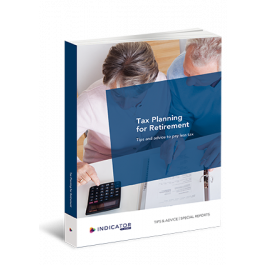Tax Planning for Retirement
Tips and advice to pay less tax
A Tips & Advice Special Report about...
In a nutshell
This Special Report is full of valuable tips and advice to maximise your retirement savings. It looks in detail at the most tax-efficient strategies for business owners and individual pension savers alike. Reflecting the latest legislation and HMRC practice, this Special Report helps you achieve the financial freedom to enjoy your later years.
In detail
In this Special Report, we cover the most tax-efficient ways to build up your pension. Use it to:
- Maximise your state pension entitlement
- Minimise the tax when you sell or wind up your business
- Boost the value of your pension fund
- Make use of occupational pension schemes
- Invest in tax-advantaged savings schemes
Increasingly, the government expects individuals to provide retirement income for themselves. Whatever method you choose to save for retirement, there’s a wide range of tax and NI incentives you can take advantage of. In plain English, this Special Report helps you plan smartly and pay less tax in retirement.
We've created this Tips & Advice Special Report especially for...
Company owners and directors, individuals that want to:
- Protect their future by increasing the value of their pension fund
- Know the most tax-efficient strategies to save for retirement
- Enjoy a financially secure and worry-free life later
Tax advisors that want to:
- Provide up-to-date tax planning advice for their clients
You'll get the following free extras with this Tips & Advice Special Report...
An online service with ready-to-use documents
- To immediately apply our advice and solutions in practice
- That you can easily adapt to suit your own requirements
In this Tips & Advice Special Report you'll read about...
1. Pension scheme basics
2. Registered pension schemes
2.1. Are registered pension schemes a tax-efficient way to save for retirement?
2.2. What are the different types of registered pension plan?
2.3. What are occupational pension schemes?
2.4. What are the tax advantages of registered pension plans?
2.5. Can you pay other pension contributions?
2.6. How do AVCs differ from FSAVCs?
2.7. How does tax relief for final salary schemes differ from that for money purchase schemes?
2.8. What are the tax incentives for money purchase schemes?
3. Paying pension contributions tax efficiently
3.1. Can anyone pay pension contributions?
3.2. What are the limits on tax relief?
3.3. How are threshold and adjusted net incomes worked out?
3.4. How did the lifetime allowance (LTA) work?
3.5. What counts as earnings for pension purposes?
3.6. Who can contribute to your pension?
3.7. Who should pay contributions for maximum tax efficiency?
3.8. Is it more tax efficient for you or your employer to pay into your pension?
3.9. What’s the tax position for unincorporated business owners?
3.10. Conclusion
3.11. What is an “in-specie contribution”?
3.12. What is the advantage of an in-specie contribution?
3.13. What are the disadvantages of an in-specie transfer?
4. The state pension
4.1. Is the state pension taxable?
4.2. How is the single tier pension worked out?
4.3. How do you top up your NI record?
4.4. Is it worthwhile topping up your NI record?
4.5. Is there a way to build up your state pension tax and NI efficiently?
4.6. If you have 35 full years’ NI credits, will paying more make any difference to your state pension?
5. Taking pension benefits - pension income options
5.1. What happens to your pension savings when you reach pension age?
5.2. What are your options for taking your money purchase pension savings?
5.3. Why take a “small pot payment”?
5.4. What’s the tax position of a small pot payment?
5.5. Is there an equivalent to small pot payments for final salary schemes?
5.6. What is an uncrystallised fund pension lump sum (UFPLS)?
5.7. How is a UFPLS taxed?
5.8. Can you use flexi-access drawdown?
5.9. Should you take a UFPLS or drawdown?
5.10. What is the tax treatment of drawdown payments?
5.11. What is tax-free cash?
5.12. When can you take a PCLS?
5.13. What is the tax treatment of a PCLS?
5.14. Should you take the maximum PCLS?
6. Pension income planning
6.1. How can you manage your pension income tax efficiently?
6.2. Which is better, UFPLS or PCLS plus drawdown?
7. Pension recycling
7.1. What is pension recycling tax free cash?
7.2. When are penalties charged for PCLS recycling?
7.3. Do the recycling rules apply to UFPLSs?
8. Unapproved pension arrangements
8.1. Why use an EFRB?
8.2. How does a typical EFRB work?
9. Alternative saving options
9.1. What if you don’t want to lock savings into a pension?
9.2. What are the pros and cons of ISAs?
9.3. What are the pros and cons of LISAs?
9.4. Which provides a better return?
9.5. What about other forms of saving?
9.6. What are tax incentive risk-finance investments?
9.7. What are investment bonds?
9.8. How can insurance bonds help you plan for retirement?
10. Property portfolios
10.1. Why property?
10.2. What about income tax?
10.3. What about CGT?
10.4. What are the different rates of CGT for residential property related gains?
10.5. Can you run a property business through a company?
11. Use your business to provide an income in retirement
11.1. How to incorporate?
11.2. Can you avoid paying tax when you incorporate your business?
11.3. How does this help with retirement planning?
11.4. How can you legitimately reduce or avoid income tax charges?
11.5. Can you pass your company to your children?
12. Winding up the company
12.1. How to secure capital gains tax treatment?
12.2. Can you save tax by starting and liquidating a series of companies?
13. Selling investments to maximise relief
14. Retiring overseas
14.1. Can you still claim your state pension if you move abroad?
14.2. Do you lose any rights?
14.3. How is income taxed as a non-resident?
14.4. Do you still get the personal allowance?
14.5. What if you have multiple sources of income?
14.6. Can you transfer your pension to a foreign plan?
14.7. Are there any tax-exempt UK investments for non-residents?
14.8. What about capital gains tax?
15. Appendices
15.1. Appendix A - final salary contribution rules
15.2. Appendix B - example calculations
15.3. Appendix C - setting up an OpRA
You can choose from the following options...
Paper
- The hard copy version
- Keep it on your desk or use it whenever you're offline
Digital
- The PDF-version
- Delivered to your inbox
Take a look at your options below.
Special subscribers' offer
£90.00
£70.00
Only if you already have a subscriptionStandard offer
£90.00
Special subscribers' offer
£90.00
£70.00
Only if you already have a subscriptionStandard offer
£90.00

Got a question? Call Customer Services
(01233) 653500


 (01233) 653500
(01233) 653500 







